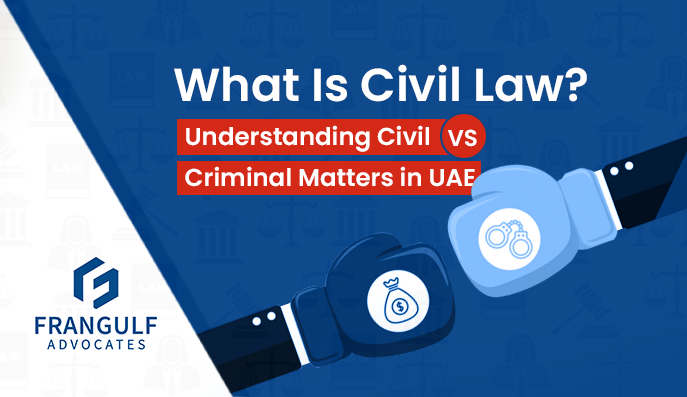What is Civil Law in UAE? Understanding Civil vs Criminal Matters

Table of Contents
- What is Civil Law in UAE ? Definition & Overview
- Key Differences on Civil vs Criminal Law
- Common Types of Civil Cases in UAE
- The Civil Lawsuit Process in UAE
- Dealing with a civil dispute in UAE?
- Civil Law vs Common Law in UAE
- When You Need a Civil Lawyer in UAE
- Your Civil Law Rights in UAE
- Conclusion
- Got a Legal Question?
Picture your business partner violating a contract for AED 500,000, your landlord withholding your security deposit, or a construction firm not completing your villa on schedule, resulting in a heavy financial loss. These are not crimes—they are civil cases that demand an entirely different legal strategy.
Most residents and businessmen in the UAE are confused with the differentiation between civil and criminal legal cases. It is important to know civil law in uae and difference because it refers to which court is going to hear your case, what verdicts you may encounter, and how you are going to act legally. The UAE legal system is distinct from other legal systems as it blends the traditions of civil law with Islamic principles, forming a system that secures the rights of both nationals and expatriates.
This in-depth guide explains what is civil law in UAE context, how it is different from criminal law, the kinds of civil cases you may face, and your rights under UAE civil law.
What is Civil Law in UAE ? Definition & Overview
Basic Definition
l law regulates disputes among individuals, corporations, or institutions. In contrast to criminal law, which sanctions crimes against society, civil law aims to settle disputes and grant compensation or remedies.
The term has two senses:
- A codified-statute based legal system (contrast with precedent-based common law).
- The area of law addressing private rights and duties.
Here we deal with civil law in the UAE perspective.
UAE Civil Law System
The UAE has a civil law tradition based on the Federal Civil Transactions Law (Federal Law No. 5 of 1985), but with an Egyptian civil code and Islamic jurisprudence influence. It governs contracts, property rights, recovery of debt, claims for personal injury, family law (for non-Muslims), and commercial disputes.
While DIFC and ADGM apply common law principles, mainland UAE relies on civil law for most residents and businesses. This framework ensures clarity in areas like contractual obligations, property transactions, inheritance, and commercial relationships.
Key Differences on Civil vs Criminal Law
Understanding the distinction between civil and criminal law is fundamental to navigating the UAE legal system effectively. Here’s a comprehensive comparison:
| Aspect | Civil Law | Criminal Law |
| Nature of Case | Private disputes and wrongs against individuals or entities | Offenses against society or the state |
| Who Files | Plaintiff (injured party) files against defendant | Public prosecutor represents the state |
| Burden of Proof | Balance of probabilities (more likely than not) | Beyond reasonable doubt (higher standard) |
| Standard of Evidence | Preponderance of evidence | Must eliminate reasonable doubt |
| Primary Goal | Compensation and remedies for the injured party | Punishment and deterrence |
| Outcomes | Monetary damages, injunctions, specific performance | Imprisonment, fines, deportation, criminal record |
| Court Division | Civil Courts | Criminal Courts |
| Party Control | Plaintiff can settle or withdraw claim | State controls prosecution even if victim wants to drop charges |
Examples in UAE Context
Typical civil cases in UAE:
- Landlord refusing to refund security deposit
- Unpaid business invoices or loans
- Defects in construction of bought property
- Wrongful dismissal claims in employment
- Disputes between owners of businesses
- Slip-and-fall accidents causing personal injuries
Common criminal cases in UAE:
- Theft or burglary
- Assault with intent to cause harm
- Offense related to drugs
- Cybercrimes and online defamation
- Bounced checks (though this has both civil and criminal connotations)
- Fraud and embezzlement
Common Types of Civil Cases in UAE
The UAE courts deal with thousands of civil disputes every year in a range of categories. These are the most frequent forms of civil cases you may deal with:
- Contract Disputes: The most common civil case, where there is disagreement over commercial contracts, service contracts, supply agreements, or partnership provisions. R If you’re facing contractual issues, FranGulf’s legal services can help you navigate these disputes effectively. Remedies can range from monetary damages, specific performance of contract provisions, or termination with compensation.
- Property & Real Estate Disputes: Especially prevalent in Dubai and Abu Dhabi, these disputes include landlord-tenant disputes, ownership disputes, building defects, and off-plan property disputes. Specialized rental dispute centers and RERA rulings simplify solutions.
- Debt Collection & Financial Claims: These involve recovery of unpaid loans, bills, or credit facilities. Although some bounced check cases are decriminalized, debt recovery is still a civil issue, where courts can order repayment.
- Employment Claims: Given the significant number of expatriate workers, claims commonly relate to wrongful dismissal, unpaid salaries, gratuities or end-of-service benefits, or breach of non-compete clauses. The UAE Labour Law provides some protections, and there is a strong encouragement of mediation prior to proceedings in court.
- Personal Injury Cases: These cases claim damages for accidents, medical negligence, industrial injuries, or product liability. Courts increasingly grant sizeable damages for permanent injuries or loss of earning capacity.
- Family Law Issues: Family issues of non-Muslim inhabitants are processed under civil law, whereas the Muslim inhabitants abide by Sharia law. Divorce, custody of children, inheritance, and alimony fall under such issues, and UAE reforms have made rights stronger, especially for women and minors.
- Commercial Disputes: Business disputes like partnership disagreements, shareholder disputes, intellectual property matters, or claims for unfair competition are prevalent. Complex commercial cases are dealt with by DIFC and ADGM Courts through common law procedures, which meet international business standards.
The Civil Lawsuit Process in UAE
Knowing the process of civil litigation in UAE prepares you in case you need to file a lawsuit or defend against one. Here is a step-by-step guide:
Step 1: Pre-litigation Consultation
Before suing, meet with a seasoned civil dispute attorney in Dubai or your emirate. Your attorney will consider the strengths of your case, collect and examine evidence, weigh possible outcomes, and estimate damages or remedies you can claim.
Numerous disputes may be amicably resolved through negotiation or mediation at this stage, without wasting time and legal expenses.
Step 2: Filing the Case
To start civil proceedings, you have to present your case before the relevant court. The UAE has various courts with their respective jurisdictions: Dubai Courts for mainland Dubai, Abu Dhabi Courts for Abu Dhabi, and DIFC Courts or ADGM Courts for cases within their respective jurisdictions.
Court charges are usually a percentage of the value of the claim, typically ranging from 3% to 7% with some ceilings. You are also required to serve formal notice on the defendant, bringing the action.
Step 3: Court Proceedings
Civil procedures in UAE are governed by federal legislations that provide for equitable and orderly treatment of cases. The procedure usually has compulsory sessions of mediation in most cases, with the courts urging parties to agree amicably. In the event mediation is not successful, the case goes to formal hearings.
Both sides present their proofs, which can be contracts, letters, fiscal documents, and witness statements. In professional cases, the court can assign specialist witnesses to state expert opinions regarding construction flaws, health problems, or finances.
Step 4: Judgment and Enforcement
Having examined all the proofs and listened to arguments, the court renders its decision. The judgment declares the rights and duties of both sides and the remedies granted.
Both debtor and creditor are entitled to appeal the judgment within a time period (normally 30 days). Once the judgment is final, the court’s execution department executes it by various methods, such as seizure of assets, deduction of salary, or restriction of travel of debtors who do not pay.
Timeline: The civil cases in Dubai and the UAE generally take between 6 to 18 months from the time of filing to final judgement, although complicated cases involving more than one party or appeals are longer.
Dealing with a civil dispute in UAE?
Let FranGulf’s experienced lawyers protect your rights and guide you to the best resolution.

Civil Law vs Common Law in UAE
The UAE presents an interesting legal landscape where different systems coexist. Understanding this distinction is important, especially for international businesses and expatriates.
Mainland UAE has a civil law system grounded in codified codes. The laws are codified in detailed codes and applied by judges to the facts of individual cases. DIFC (Dubai International Financial Centre) is unique in its legal system, with principles similar to common law in the UK legal system. ADGM (Abu Dhabi Global Market) also follows common law.
The most significant distinction is how precedent functions. In civil law jurisdictions such as mainland UAE, there is no binding effect of prior court decisions, although they can be persuasive. In common law jurisdictions such as DIFC, precedent is highly influential, and courts are usually bound by decisions of superior courts.
This is important when selecting where to bring your case. In the event you can choose jurisdiction (say, if your contract calls for DIFC Courts), knowing which system governs impacts your litigation strategy, procedures, and possibly your result.
For most civil cases between residents and businesses in Dubai, Abu Dhabi, Sharjah, and the other emirates, the UAE Civil Code and civil law system govern.
When You Need a Civil Lawyer in UAE
Although simpler civil issues can be done on one’s own, legal professional service is absolutely essential in most cases:
Situations Where Legal Representation is Necessary
- Complicated contract interpretations – Legal knowledge required to interpret terms, conditions, and obligations as per UAE law
- Major property transactions or disputes – Large sums of money involved necessitate prudent legal attention
- Defense against civil suits – Civil procedure knowledge and proper defense techniques essential
- Multi-party business disputes – Sophisticated relationships that necessitate coordination of legal positions
- Cross-border transactions – Foreign aspects require lawyers with knowledge of conflict of laws principles
- Managing UAE court procedures – Difficult for expatriates that are not familiar with the system
- Technical legal writing – Preparation of contracts, legal notices, and court pleadings
- Evidence collection and presentation – Proper documentation and coordination with witnesses
Additional Value:
- Language aspects – Arabic is the official language of courts; lawyers perform the translation
- Cultural sensitivities – Familiarity with local legal culture and judicial requirements
- Technical procedural requirements – Adherence to filing deadlines and court processes
- Strategic benefit – Professional advocacy greatly enhances success rates
Pro tip: Early appointment of a civil lawyer often averts escalated disputes. Most can be amicably settled or resolved by well-formulated legal notices before resorting to court hearings
Your Civil Law Rights in UAE
Knowledge of your civil law rights in the UAE makes you able to assert your interests effectively:
- Right to legal recourse for violation of rights or contracts
- Right to have legal representation in civil cases
- Right to an impartial hearing before a civil court
- Protection of contracts under the UAE Civil Code
- Equal access to civil justice for UAE nationals, residents, and foreign investors
These rights are equally applicable to individuals and companies, nationals and expatriate residents of the UAE. The UAE legal system is such that it ensures fair and effective resolution of civil disputes, safeguarding the rights of all stakeholders with social and economic stability.
Conclusion
UAE civil law offers a broad structure for the settlement of private disputes, safeguarding contractual rights, and providing compensation for inflicted wrongs. Civil law is in contrast to criminal law, whose aim is penalizing offenses committed against society, because civil law is concerned with remedies, restitution, and restoration of rights.
Understanding the difference between civil and criminal cases enables you to deal with the UAE court system efficiently. Whether you are facing a dispute over a contract, a property issue, an employment grievance, or an individual injury, familiarizing yourself with your rights and channels of law makes a big difference in getting a favorable result.
The UAE civil law system, founded upon well-developed codes and principles, provides strong protection for both the UAE nationals and the multicultural expatriate community. With the right legal advice and knowledge of your rights, you can approach civil legal concerns with confidence and safeguard your interests. Contact FranGulf Advocates today for a confidential consultation or check out our Civil Lawyer page to find out more about how we can assist in resolving your civil legal concerns quickly and effectively.
Got a Legal Question?
What is the main difference between civil and criminal law in UAE?
Civil law deals with disputes between private parties seeking compensation or remedies, while criminal law involves the state prosecuting offenses against society. Civil cases require proving your claim on the balance of probabilities, whereas criminal cases demand proof beyond reasonable doubt. Civil outcomes include compensation and injunctions, while criminal penalties include imprisonment, fines, and deportation.
How long does a civil case take in Dubai courts?
Civil cases in Dubai typically take 6 to 18 months from filing to judgment, depending on case complexity, the volume of evidence, whether expert witnesses are needed, and if appeals are filed. Simple cases, particularly those resolved through court-mandated mediation, may be resolved faster, sometimes within 3 to 6 months.
Can I represent myself in civil court in UAE?
Yes, self-representation is allowed in UAE civil courts. However, it’s generally not recommended for complex cases. Professional legal representation significantly improves your chances of success, especially given potential language barriers (Arabic is the court language), technical procedural requirements, and the complexity of legal arguments. For high-value or complicated disputes, hiring an experienced civil lawyer is strongly advisable.
Can expatriates file civil cases in UAE?
Yes, expatriates have full access to UAE civil courts and enjoy the same legal protections as UAE nationals in civil matters. Legal residents can file claims, defend lawsuits, and enforce judgments regardless of nationality. The UAE legal system treats all parties equally in civil disputes, ensuring fair access to justice for the country’s diverse population.
Facing a Legal Challenge? We’re Just One Call Away
Confidential, expert, and results-driven legal advice.






